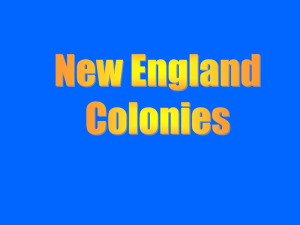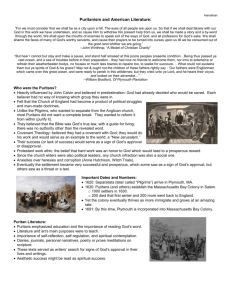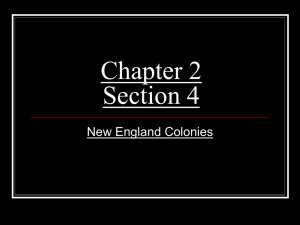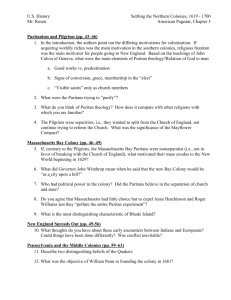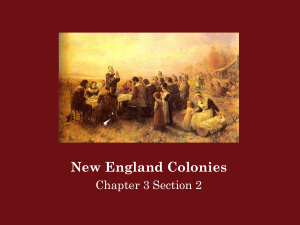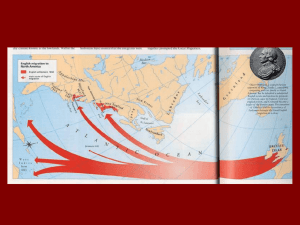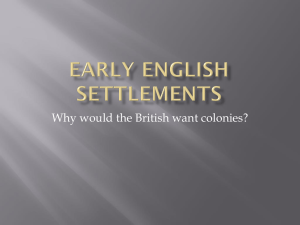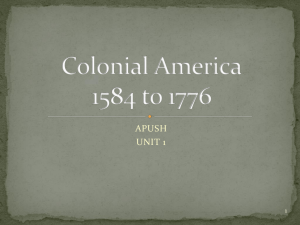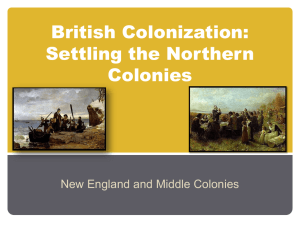12/7/15 Reasons for Immigration
advertisement
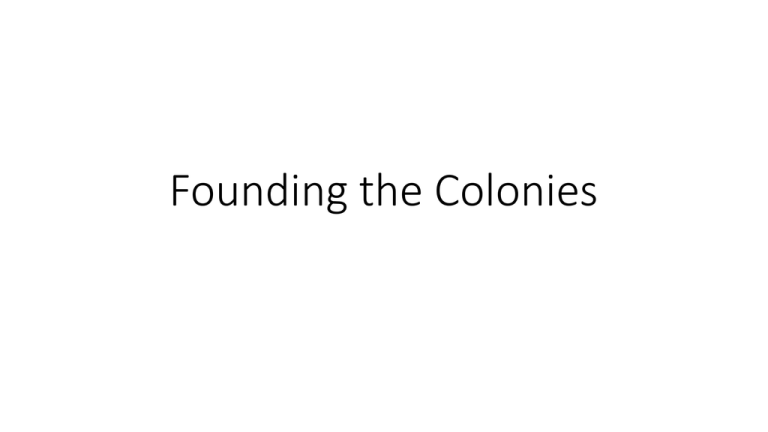
Founding the Colonies Roanoke Island: Established as an Economic Venture in 1587. As governor, John White hoped to establish the first permanent English settlement in the New World by developing a selfsufficient economy and agriculture. Settled on Roanoke Island. August 1587 John White left to get more supplies from England. He could not return for 3 years do to England’s war with Spain. When he got back the colony was gone. Only Croatoan carved into a tree. Croatoan was the name of a friendly Indian Tribe to the south, but bad weather prevented White from going to look. Called the Lost Colony. In 1709 an explorer claimed to have met English speaking natives with European traits in the area who claimed to be descended from white people. This is one theory of what happened to them. Jamestown: The London Company of Virginia set up a joint stock company for a new venture in the Americas in 1607. A joint stock company is where investors pooled their resources in hopes of striking it rich but at the same time sharing in the losses. Jamestown was an economic venture to collect gold and natural resources to sell for $$ back in England. Gentlemen were brought to oversee gold collection. And few knew how to work. Little food and fresh water meant the colonists were dependent on the Indians. Smith’s no work no eat policy made the gentlemen mad. Winter of 1609-1610: called the Starving Time. (one of worst droughts VA had experienced, poor harvest, rats in food stores, led to cannibalism) http://historicjamestowne.org/archaeology/jane/history/ Only 60/500 survived the winter. They tried to go home but more supplies came. Yay! Cash Crop John Rolfe married Pocahontas and began experimenting with native plant- tobacco! English loved it, and it became as good as gold. The plantation economy depended on a steady supply of cheap labor. Before African Slaves were introduced, they needed people willing to sell their labor in exchange for a free ride across the Atlantic. These came to be known as Indentured Servants. By 1700, slavery became the backbone of the southern plantation economy, which could set the colonies on different paths that would eventually lead to the American Civil War in 1860. Colonists Escape Religious Persecution: http://www.history.com/topics/us-states/massachusetts/videos/puritans-vs-pilgrims Plymouth: After the Reformation, (people breaking away across Europe from the Catholic Church and its authority) some people believed that the Church of England was still too Catholic. Pilgrims wanted to separate their beliefs from the Church of England but maintain their cultural identity as Englishmen. They established a colony in Plymouth, Mass. A member of the Pawtuxet tribe who had been kidnapped by the explorer John Smith and taken to England, only to escape back to his native land, Squanto acted as an interpreter and mediator between Plymouth’s leaders and local Native Americans. In the fall of 1621, the Pilgrims famously shared a harvest feast with the Pokanokets; the meal is now considered the basis for the Thanksgiving holiday. The Mayflower Compact, signed by 41 English colonists on the ship Mayflower on November 11, 1620, was the first written framework of government established in what is now the United States. The compact was drafted to prevent dissent amongst Puritans and non-separatist Pilgrims who had landed at Plymouth a few days earlier. Religious Persecution: Massachusetts Bay Colony While the Pilgrims were occupied with the problems of survival, the better organized and provisioned Puritans who founded the Massachusetts Bay Colony came with a mission, to establish their own shining ‘citty [sic] upon a Hill,’ free of the sin and corruption of the land and society they were leaving. Religion and government were deeply intertwined in the Massachusetts Bay Colony and only the most devout Puritans could participate in governmental affairs. The Puritans were highly intolerant of other religions and came to the New World specifically to escape religious persecution and create their own community where they could live only among like-minded people. The company could erect a self-governing religious commonwealth. It would allow the leaders to create the kind of society they wanted, a ‘City of God in the wilderness Religious Freedom- Pennsylvania The middle colony of Pennsylvania was granted to an English Quaker named William Penn in 1681. Quakers disagreed with the beliefs and ceremonies of other churches. The democratic principles that he set forth served as an inspiration for the United States Constitution. Ahead of his time, Penn also published a plan for a United States of Europe including a democratic system with full freedom of religion, fair trials, elected representatives of the people in power, and a separation of powers — again ideas that would later form the basis of the American constitution. Economic Freedom: Georgia Georgia was started in 1732 . Created to help English debtors improve their lives. At the time of the charter, British prisons were being overcrowded by people in debt. Oglethorpe spent much of his time in England working with the poor and insisted that the formation of a new colony would allow debt-ridden people a fresh start. His idea was to create an asylum for the poor and the persecuted Protestants. King George was unconcerned about English debtors. Instead, he saw Georgia as an attractive opportunity to create a buffer zone between Spanish-owned Florida, French-owned Louisiana and the English colonies farther north. He approved the Georgian experiment, and thousands of debtors moved to the colony.
